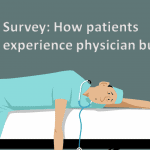In September 2019, I presented clinicians and non-clinicians with a word-association survey on my website. I asked readers of my monthly newsletter (and followers on social media) to weigh in the same two questions:
- Which terms would you associate with the POSITIVE/GOOD side of American medical culture?
- Which terms would you associate with the NEGATIVE/BAD side of American medical culture?
Here are the results, segmented by clinicians (grey line) and non-clinicians (blue line):


When asked to identify the terms they most closely associate with the good side of medical culture, both clinicians and non-clinicians agreed that “dedication,” “innovation,” “intelligence” and “compassion” stood apart from the other options. And when asked to weigh in on the negative side of medical culture, once again, both sets of responses were nearly identical. Both doctors and patients felt that “inefficiency,” “greed” and “disorganization” stand in the way of excellent care.
The biggest surprise in these results is that these two different groups selected the same words in nearly the same order. This tells me that both doctors and patients ultimately want the same things from medicine. Doctors dedicate their lives to the profession, making a tremendous sacrifice that their patients appreciate and value. Patients, in turn, take great comfort in knowing their physicians commit themselves to such demanding and rigorous training. Doctors want to be on the cutting edge of medicine, developing innovations that change the game and transform patient health, which is undoubtedly what American patients expect from the world’s most expensive healthcare system.
Finally, doctors want to demonstrate compassion and in so doing earn the trust of their patients. Patients, likewise, hope to receive the kind of compassionate care every individual deserves.
To get the latest survey results each month and be the first to take future surveys, sign up for my free newsletter “Monthly Musings on American Healthcare.”
Dr. Robert Pearl is the former CEO of The Permanente Medical Group, the nation’s largest physician group. He’s the bestselling author of “Mistreated: Why We Think We’re Getting Good Health Care–And Why We’re Usually Wrong” and a Stanford University professor. Follow him on Twitter @RobertPearlMD.







Hi I could not find anything choose from the list of positives. I think while adherence to protocol/codes can lead to inefficiency and higher cost, it is also adds to the discipline that makes it more reliable…compared to many other countries that lack basic hygiene and process discipline.
My write in negative would be lack of transparency. As patients, we have no information to make informed decisions based on variable costs and outcomes across different facilities and practitioners.
The word “convolution” comes to mind when I think of American healthcare. Our system seems, at times, unbearably daunting.
Great word and point, it is absolutely “convoluted.”